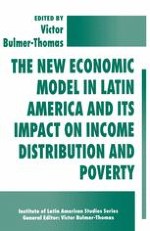1996 | OriginalPaper | Chapter
Chronic Fiscal Stress and the Reproduction of Poverty and Inequality in Latin America
Author : Laurence Whitehead
Published in: The New Economic Model in Latin America and its Impact on Income Distribution and Poverty
Publisher: Palgrave Macmillan UK
Included in: Professional Book Archive
Activate our intelligent search to find suitable subject content or patents.
Select sections of text to find matching patents with Artificial Intelligence. powered by
Select sections of text to find additional relevant content using AI-assisted search. powered by
About 15 years have elapsed since the Latin America-wide ‘debt crisis’ began, and about half as long since the post-debt crisis framework of a new economic model (sometimes loosely labelled ‘the Washington consensus’, or more polemically ‘neo-liberalism’) took shape. The sub-continent was notorious for the levels of poverty and economic inequality prevailing before the debt crisis, and in broad terms these have either been reproduced or even in some cases intensified during the 1980s. The new economic model (NEM) of the 1990s will have to gather further momentum before it can be expected to make a sustained impact on these long-established inequities. Even if this occurs, conclusive evidence will not be available for some years to come. The best provisional assessments so far available reveal clear conflicts of interpretation.1 Legitimate disagreement in this field is easy to explain. Thus, the quality of the data varies greatly, both within and between countries; individual country studies can be quoted to support one thesis or another, but it is far from clear that, say, a Chilean success story foreshadows similar outcomes in other countries; the disproportionate size and deviant pattern of the Brazilian economy means that counting countries and counting poor people can produce very divergent interpretations of poverty trends; such trends are in any case affected by demographic and structural forces as well as by policy choices; moreover, any given economic model may produce a variety of effects depending on how well or badly it is implemented, and whether the broader context is supportive or destabilising; internationally comparable ‘poverty lines’ are conceptually questionable, since above the bare minimum required for physical survival, basic capabilities (jobseeking) depend on the living standards of others; finally, of course, the time lags separating policy change from poverty results are long and variable, and secular shifts or continuities may be masked by strong cyclical effects.2
